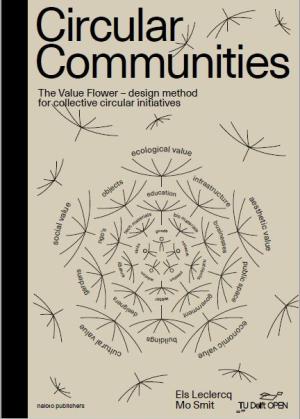Circular Communities: The circular value flower as a design method for collectively closing resource flows
Keywords:
circular economy, multiple value creation, co-production, spatial interventions, citizen engagement, integral approach, community design, neighbourhood designSynopsis
In Circular Communities, pioneering, collectively supported initiatives that are aimed at closing resource cycles at neighbourhood level take a central position. They are all examples of initiatives that contribute to the transition to a circular economy. For the analysis of these different circular initiatives, the researchers – urban designer Els Leclercq and architect Mo Smit - developed a unique method: the Circular Value Flower method. This method helps to organize the collective closing of resource cycles (bio and tech materials, energy, water and nutrients) on a neighbourhood scale and provides insight into the added value (social, ecological, aesthetic, cultural and economic) that can be realized within the built environment. Circular Communities offers inspiration and lessons for integral sustainable interventions at the scale of the neighbourhood and ties in with the new Dutch Environmental Planning Act, which explicitly offers room for citizen initiatives and local commissioning in the Netherlands.
Downloads
References
Actieagenda Ruimtelijk Ontwerp 2017-2020: Samen Werken aan Ontwerpkracht. (Spatial Design Action Programme: Working on Design Power Together) https://samenwerkenaanontwerpkracht.nl
Aiken, G.T. (2017). The politics of community: Togetherness, transition and post-politics. Environmental Planning A. 49: 2383-2401 https://doi.org/10.1177/0308518X17724443
Arnstein, S. (1969). A Ladder of Citizen Participation. Journal of the American Institute of Planners. 35(4): 216 -224 https://doi.org/10.1080/01944366908977225
Bekkers, V., Tummers, L. (2018). Innovation in the public sector: Towards an open and collaborative approach. International Review of Administrative Sciences, 84(2), 209-213 https://doi.org/10.1177/0020852318761797
Bosschaert, T. (2022), Circularity is not sustainability - how well-intentioned concepts distract us from our true goals, and how SiD can help navigate that challenge. In: The impossibilities of the Circular Economy - Separating Aspirations from Reality. New York: Routledge See also: https://360dialogues.com/360portfolios/ce-impossibilities https://doi.org/10.4324/9781003244196-9
Carayannis, E. G., Campbell, D. F. (2010). Triple Helix, Quadruple Helix and Quintuple Helix and how do knowledge, innovation and the environment relate to each other?: A proposed framework for a trans-disciplinary analysis of sustainable development and social ecology. International Journal of Social Ecology and Sustainable Development (IJSESD). 1(1): 41-69 https://doi.org/10.4018/jsesd.2010010105
Davoudi, S., Madanipour, A. (red.) (2015). Reconsidering Localism. New York: Routledge https://doi.org/10.4324/9781315818863
De Bruin (2017) Participatiesamenleving anno 2017: volop kansen (Participation society in 2017: ample opportunities), Movisie.
Dietz, T., Ostrom, E., Stern, P. (2003). The Struggle to Govern the Commons. Science. 203: 1907- 1912) https://doi.org/10.1126/science.1091015
Durose, C., Escobar, O., Gilchrist, A., Agger, A., Henderson, J., Van Hulst, M., Van Ostaijen,M. (2019). Socially smart cities: Making a difference in urban neighbourhoodshttp://smart-urban-intermediaries.com
Ellen MacArthur Foundation. (2012). Towards the circular economy: economic and business rationale for an accelerated transition. Ellen MacArthur Foundation.
Evans, J., Karvonen, A., Raven, R. (eds). 2016. The Experimental City. London: Routledge https://doi.org/10.4324/9781315719825
Fainstein, S. (2010). The Just City. Cornell University Press
Florida, R. (2008). Who's Your City? How the Creative Economy Is Making Where to Live the Most Important Decision of Your Life. Basic Books
Fotino, F., Calabrese, M., Lettieri, M. (2018). Co-creating value in urban public policy contexts: A different approach. Land Use Policy.79: 20-29 https://doi.org/10.1016/j.landusepol.2018.06.010
Franklin, A., Marsden, T. (2015). (Dis) connected communities and sustainable place-making. Local Environment 20, 940-956 https://doi.org/10.1080/13549839.2013.879852
Gemeente Amsterdam (2020) Stadsmonitor Amsterdam (City Monitor Amsterdam).
Ghisellini, P., Cialani. C., Ulgiati. S. (2016). A review on circular economy: The expected transition to a balanced interplay of environ-mental and economic systems. Journal of Cleaner Production. 114 ( 7 ) : 11- 3 2 https://doi.org/10.1016/j.jclepro.2015.09.007
Hajer, M. (2009). Authoritative Governance: Policy Making in the Age of Mediatization. Oxford University Press https://doi.org/10.1093/acprof:oso/9780199281671.001.0001
Hajer, M. (2011). Signalenrapport 'De energie-ke samenleving. Op zoek naar sturingsfiloso-fie voor een schone economie' (Signal report 'The energetic society. In search of steering philosophy for a clean economy'). Netherlands Environmental Assessment Agency
Hughes, S., Hoffmann, M. (2020). Just urban transitions: Toward a research agenda. Wiley Interdisciplinary Reviews: Climate Change,11( 3 ) . https://doi.org/10.1002/wcc.640
Klijn, E-H., Koppenjan, J. (2015). Governance Networks in the Public Sector. Oxford: Routledge https://doi.org/10.4324/9781315887098
Koefoed, O. (2019). Urban nature as transformed practice - A case of multi-dimensional processing to increase public value in Copenhagen. Local Economy. 34(6) 525-54 https://doi.org/10.1177/0269094219882670
Kuitert, L. (2021) The balancing act. How public construction clients safeguard public values in a changing construction industry. Delft University of Technology
Lloyd, K., Fullagar, S., Reid, S., (2016). Where is the 'Social' in Constructions of 'Liveability'? Exploring Community, Social Interaction and Social Cohesion in Changing Urban Environments, Urban Policy and Research. 34:4, 343-355 https://doi.org/10.1080/08111146.2015.1118374
Majoor, S., Smit, V. (2019). De wijk als plek van verandering (The neighbourhood as a place of change). In: Helleman, G., Majoor, S., Smit, V., Walraven, G. Plekken van hoop en verandering. Samenwerkingsverbanden die lokaal het verschil maken (Places of hope and change. Partnerships that make the difference locally).Utrecht: Academische Uitgeverij Eburon.
Mattijssen, T. J. M., Buijs, A. A. E., Elands, B. H. M., Arts, B. J. M., van Dam, R. I., & Donders, J. L. M. (2019). The Transformative Potential of Active Citizenship: Understanding Changes in Local Governance Practices. Sustainability.11( 2 0 ) https://doi.org/10.3390/su11205781
Meijer A.J. (2014). New Media and the Co-production of Safety: An Empirical Analysis of Dutch Practices. The American Review of Public Administration. 44(1): 17-34 https://doi.org/10.1177/0275074012455843
Ministerie van Verkeer en Waterstaat (Minis-try of Infrastructure and Water Management) (2016). Nederland Circulair in 2050 - Rijksbreed Programma Circulaire Economie (The Netherlands Circular in 2050 - Government-wide Circular Economy Programme).
OECD (2020), How's Life? 2020: Measuring Well-being, OECD Publishing, Paris, https://doi.org/10.1787/9870c393-en https://doi.org/10.1787/9870c393-en
Planbureau voor de Leefomgeving (Netherlands Environmental Assessment Agency) (2019). Scenario's voor stedelijke ontwikkeling, infrastructuur en mobiliteit - verdieping bij oefenen met de toekomst (Scenarios for urban development, infrastructure and mobility - greater depth when practising with the future).
Planbureau voor de Leefomgeving (Netherlands Environmental Assessment Agency) (2019). Circulaire Economie in Kaart (Circular Economy Explored). www.pbl.nl/sites/default/downloads/pbl-circulaire-economie-in-kaart-3401
Pomponi, F., Moncaster, A., (2017). Circular Economy for the Built Environment: A Research Framework. Journal of Cleaner Production. 14 3: 710 -18 . https://doi.org/10.1016/j.jclepro.2016.12.055
Raworth, K. (2017) Doughnut Economics. Seven Ways to Think Like a 21st Century Economist. London: Penguin Random House
Reinhard, S., Verhagen, J., Wolters, W., Ruerd, R. (2017). Water-food-energy nexus: A quick scan. Wageningen, Wageningen Economic Research, Report 2017-096. https://edepot.wur.nl/424551 https://doi.org/10.18174/424551
Rijksoverheid (Government of the Netherlands) (2019). Klimaatakkoord (Climate Agreement). https://www.klimaatakkoord.nl
Soeterbroek, F. (2015). Stadsmakers als happy infiltrators in de systeemwereld (City-makers as happy infiltrators in the systemic world). In: Franke, S., Niemans, J., Soeterbroek, F. Het Nieuwe Stadmaken - Van gedreven pionieren naar gelijk speelveld (The New City-making - From passionate pioneering to level playing field). TrancityXValiz.
Soja, E. (2010). Seeking Spatial Justice.University of Minnesota Press https://doi.org/10.5749/minnesota/9780816666676.001.0001
Trebeck, K., en Williams, J. (2019). The Econo-mics of Arrival: Ideas for a grown-up economy. Bristol: Policy Press https://doi.org/10.46692/9781447337843
Uitermark, J. (2015). Longing for Wikitopia: The study and politics of self-organisation. Urban Studies. 52(13): 2301-2312 https://doi.org/10.1177/0042098015577334
Van de Wijdeven, T. (2012). Doe democratie - Over actief burgerschap in stadswijken (Do democracy - On active citizenship in urban neighbourhoods). Delft: Uitgeverij Eburon
Van der Schot, J. (2016). Besturen met Burgerkracht, samenspel in de energieke samenleving (Governing with Citizen Power, interplay in the energetic society). Retrieved from: https://www.duurzaamdoor.nl/sites/default/files/2019-02/Duurzaam%20Door%20Besturen%20door%20Burgerkracht%20proef5.pdf
Van Dorst, M. (2012). Liveability. In: Van Bueren, E., Van Bohemen, H., Itard, L., Visscher, H. Sustainable Urban Environments - An Eco-system Approach. Dordrecht: Springer https://doi.org/10.1007/978-94-007-1294-2_8
Van Reybrouck, D. (2016). Tegen Verkiezingen (Against Elections). Uitgeverij De Bezige Bij b.v.
Wilcox, D., (1994). The Guide to Effective Participation. London: Partnership Books

Published
Categories
License

This work is licensed under a Creative Commons Attribution-NonCommercial 4.0 International License.



